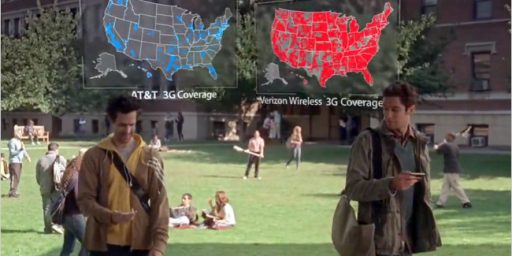Phone Books: End of an Era
 More than a decade after they’ve outlived their usefulness, one major company has asked that they be allowed to stop publishing residential telephone directories.
More than a decade after they’ve outlived their usefulness, one major company has asked that they be allowed to stop publishing residential telephone directories.
The digital age may claim another victim.
The residential White Pages, those inches-thick tomes of fine-print telephone listings that may be most useful as doorstops, could stop landing with a thud on doorsteps across New York later this year.
Verizon, the dominant local phone company in the state, asked regulators on Friday to allow it to end the annual delivery of millions of White Pages to all of its customers in New York. The company estimates that it would save nearly 5,000 tons of paper by ending the automatic distribution of the books.
Only about one of every nine households uses the hard-copy listings anymore, according to Verizon, which cited a 2008 Gallup survey. Most have switched to looking up numbers online or calling directory assistance. The phone book for many people, it seems, has gone from indispensable tool to unavoidable nuisance.
“Phone books have been a very visceral issue,” said Scott Cassel, executive director of the Product Stewardship Institute, an environmental group in Boston. “They do tend to pile up, particularly in apartments. More and more, people are finding that they don’t need them, but they can’t find a way to make them stop.”
[…]
Customers who prefer to look up phone numbers the old-fashioned way or, like Steve Martin’s character in “The Jerk,” get a thrill from seeing their names in print, would still be able to have the White Pages delivered to them in book form or on compact disc.
Verizon hopes that regulators will waive the requirement that it deliver White Pages to all New Yorkers before the end of the year, said John Bonomo, a company spokesman. He said he did not know how many copies of the White Pages were distributed annually, but said the total was in the millions in New York City alone. James Denn, a spokesman for the state’s Public Service Commission, said that it had not received a similar petition from any other phone service provider.
Verizon has a similar request before regulators in New Jersey, Mr. Bonomo said. In some states, including Florida, Ohio, Oklahoma and Georgia, AT&T has already received approval to stop delivering White Pages to all residents.
But Mr. Cassel, whose group’s causes include reducing the production of unwanted telephone directories, said AT&T had withdrawn a proposal to end annual distribution in North Carolina after advocates for the elderly complained that some people might lose contact with friends and neighbors if they did not receive updated directories.
While I get that telephone service is a regulated utility, it’s baffling that a company has to petition government to stop delivering a wasteful product. Especially if they’re actually going to continue to make the product available to the small fraction of customers that still wants it.
It’s simply idiotic to keep wasting all that paper to produce and gasoline to deliver something that most of us don’t want. In Northern Virginia, it seems that we get five or six of these things, as several providers dump off volumes of white pages, yellow pages, or combination books. Mine tend to remain in the driveway until Monday afternoon, when I carry the recycling bins down, at which point I toss them in. What a waste.






We don’t use our phone book. We actually don’t even have landline phones anymore and have gone to cell phone only.
I don’t think I ever realized the government actually required the phone company to deliver the book. This seems like an outdated requirement now and the deliveries a waste of materials, money and time.
Baffling? I’m not even awake yet, but it seems a natural feature of a regulated monopoly. Way back when, someone made part of “the deal” that Bell could have the phone business if they did X, Y, and Z.
Somewhere in that list was phone books.
(The “breakup” to baby Bells made a regional monopolies, but did not eliminate them.)
Perhaps the regulators could respond by requiring that a call to directory assistance be great reduced or made free in return.
One point… I assume that yellow pages will still be published since it is generally a for profit business.
Where I live, they actually charge to “not publish” your number, and even more to have an “unlisted” number.
I don’t suppose this would mitigate those unsolicited calls from telemarketers, since the phone company would likely sell the listings to them anyway and charge you for “not” being on the list.
It should not be baffling on any level, James; compare the old telephone companies with the wrote industry, particularly pre-1976. The reason that the railroad’s one under was because they were required to maintain unprofitable passenger routes.
The broadcast industry would seem to be on other area where government over regulation and over control has been leading to lower and lower and lower profit margins, and lower and lower and lower rates of survival.
Now, let’s consider the degree of control that the Federal government has exhibited over the past 40 years over the auto industry.
Does seem to be something of a pattern developing here.
… even as the government massively subsidized auto transportation.
Indeed, back out those interstate highways paid for with general tax funds, and those old rail routes might look cost-effective.
(Just checked a train rate from southern California to Oregon. I can drive it for half the cost. Of course, you all helped pay for Highway 5.)
Even given that, the rials would have been able to survive absent the over-regulation and over unionization of their industry. The same is happening to the auto industry. In both cases the over and vote meant of government was the proximate cause of their failure, and in both cases the government stepped in to “save the industry”. All while never acknowledging their role in its destruction.
Well in my area I’ve been forced to use the telephone book many times as online lookups failed miserably.
What I love about Bit is that every problem in the world is created by government and unions lol…
every problem? No; merely the most sticky of them. After all what screw up is more potent than one with the power of law behind it ?
And this is , after all, a current events and political website. Why would government not figure prominently in the current problems of the day?